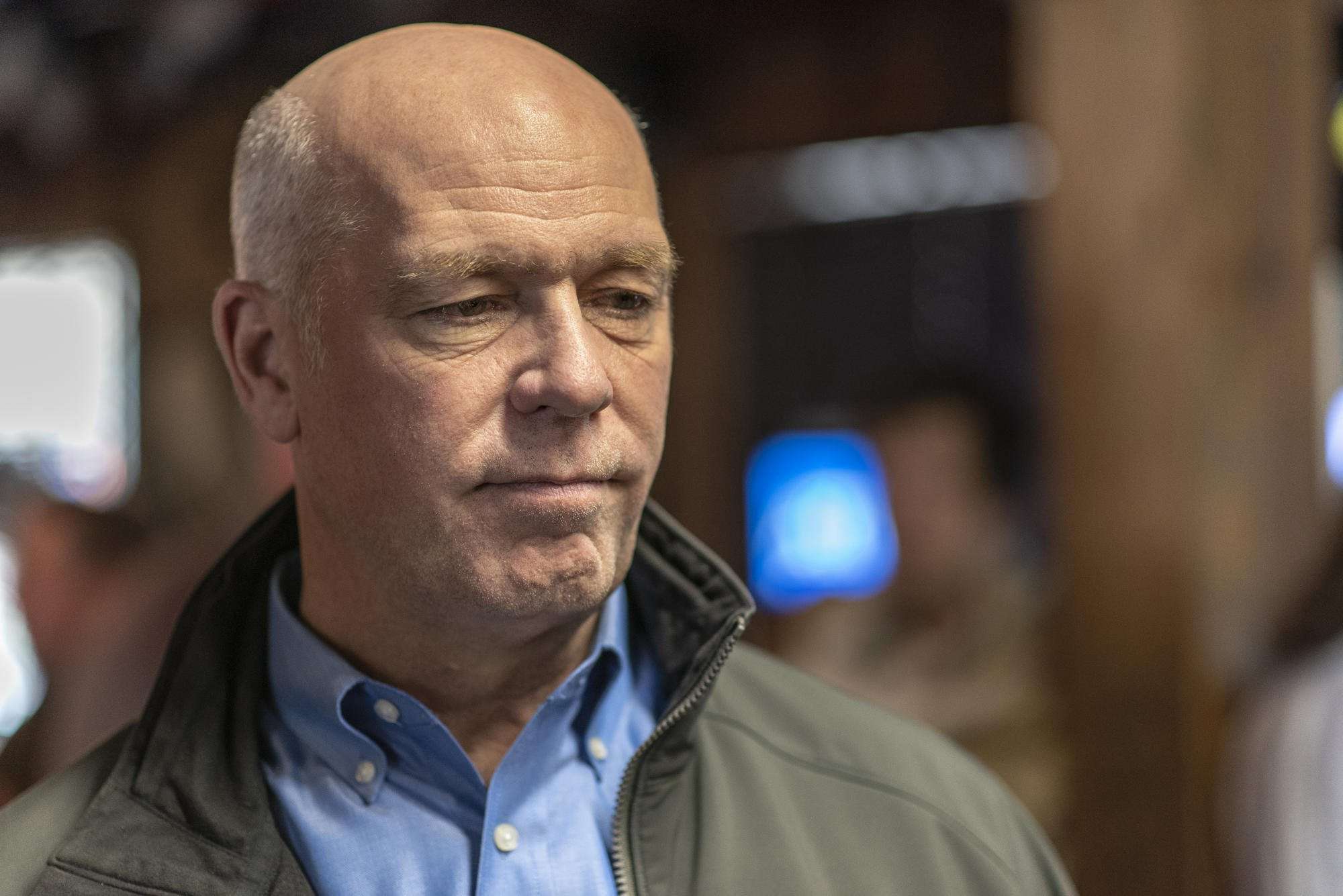Montana plans to stop some of its federally-funded unemployment benefits to address “the state’s severe workforce shortage,” according to its labor department, which will leave many out-of-work residents without any support at all.
“Nearly every sector in our economy faces a labor shortage,” Governor Greg Gianforte said in a statement on Tuesday. “The vast expansion of federal unemployment benefits is now doing more harm than good.”
Instead, the state will begin to offer return-to-work bonuses to help employers looking to hire.
Starting June 27, Montanans will lose access to the extra $300 in weekly unemployment benefits, but maintain their regular benefits. Contractors, gig workers, and others will also lose access to the Pandemic Unemployment Assistance (PUA) program, meaning those workers won’t get any benefits.
Montana Republican Congressman Greg Gianforte meets with members of the business and environmental community at Chico Hot Springs below Emigrant Peak on October 10, 2018 in Pray, Montana. (Photo by William Campbell-Corbis via Getty Images)
Those relying on the Pandemic Emergency Unemployment Compensation (PEUC) program, which gives additional weeks of unemployment benefits to workers, will stop receiving benefits. The state also plans to reinstate the requirement that stipulates workers must be actively searching for a job to qualify for unemployment benefits.
Read more: Top 10 tax mistakes — and how to avoid them
“Montana’s move to end these fully federally-funded UI programs, along with their COVID-19 exceptions, is cruel, ill-informed, and disproportionately harms Black and Indigenous People of Color and women,” Alexa Tapia, unemployment insurance campaign coordinator at the National Employment Law Project, told Yahoo Money. “Ending these programs would leave 22,459 people unable to support their families and hurt thousands more.”
Montana's unemployment rate was 3.8% in March, down from its 11.9% pandemic peak in April 2020, according to data by the Labor Department.
The federally-funded unemployment programs run through September 6 nationwide. Montana’s cancellation would cost workers at least $3,000 per worker in supplement benefits if they couldn’t find work through the program expiration. Workers on PUA and PEUC would lose at least $4,500 in benefits because they no longer will be eligible for the base unemployment benefit.
Different papers have established that the extra $600 in benefits distributed earlier in the pandemic had limited labor supply effects and likely didn’t disincentivize work, including one by the National Bureau of Economic Research and another by Yale University. The current supplemental benefit is worth half of what those papers reviewed.
“The 100% federally-paid unemployment benefits have boosted spending and contributed to the strong economic recovery,” Andrew Stettner, an unemployment insurance expert and senior fellow at the Century Foundation, told Yahoo Money. “It's shortsighted for the state to sacrifice that economic stimulus based on the anecdotal labor shortages concerns of a few employers, especially given the limited evidence of work disincentives from unemployment pay during the pandemic."
Yahoo Money sister site Cashay has a weekly newsletter.
Montana is the first and only state to fully opt out of the federal unemployment benefit programs enacted in the pandemic and currently extended by the American Rescue Plan signed into law in March.
As a way to incentivize workers to return to work, the state is offering a one-time return-to-work payment of $1,200, using money from the American Rescue Plan to fund the program. Only those who complete four weeks of work would receive the payment.
“Incentives matter,” Gianforte said. “Our return-to-work bonus and the return to pre-pandemic unemployment programs will help get more Montanans back to work.”
Denitsa is a writer for Yahoo Finance and Cashay, a new personal finance website. Follow her on Twitter @denitsa_tsekova
Follow Yahoo Finance on Twitter, Facebook, Instagram, Flipboard, SmartNews, LinkedIn, YouTube, and Reddit.

AthiestSaintofYashua on May 6th, 2021 at 01:30 UTC »
I was nearly fired the other day over a conversation regarding this, though in a different state. It was mentioned that the local businesses are having a hard time finding anyone to hire. I asked if those businesses were offering decent salaries, if they weren't, they created their own problems. Turns out we're one of those having a hard time filling positions, for that very reason. If you have a job at this point in time in many fields, you have little worry of losing it. And for many with jobs, now may be a good time to look for other opportunities. You couldn't have more leverage than now. As do those not yet employed. Take only the good offers, or at least make the term "competitive wages" mean what it should.
JunjiMitosis on May 6th, 2021 at 01:23 UTC »
A lot of these places are just never going to get the workforce they used to because people are done with certain industries and/or just don’t have to depend on working them like people did in past months.
Just look at places like r/kitchenconfidential and you’ll see that many people are leaving those industries for good and won’t be coming back. The underpayment, the long hours, weekends, holidays, no time off or sick days has never been desirable and the fact that whole industries depend on peoples desperation is disgusting. I personally am not willing to take that kind of treatment anymore, even if it means I have to move back in with my mom. And I know a lot of people who feel the same. Life is too short to be as unhappy as a lot of these workers are
hdfvbjyd on May 6th, 2021 at 00:30 UTC »
The beatings will continue until moral improves